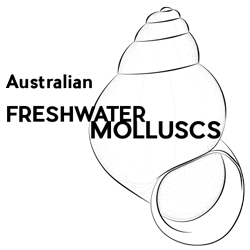
This species belongs to the Austropyrgus cooma group, whose members are characterised by generally pupiform to conical, small to medium-sized shells, where the last whorl and base are evenly convex.
A. macedonensis differs from other members of the group in the following combination of characters: shell small, with convex spire outline and convex whorls; aperture slightly disjunct; pericardium about ½ in pallial roof; prostate gland broadly oval in cross-section. The species is most similar to A. daylesfordensis, and to a lesser extent to A. otwayensis, A. grampianensis (which is smaller) and A. avius.
Austropyrgus macedonensis Clark, Miller & Ponder, 2003
Class Gastropoda
Infraclass Caenogastropoda
Order Littorinida
Suborder Rissoidina
Superfamily Truncatelloidea
Family Tateidae
Genus Austropyrgus Cotton, 1942
Original name: Austropyrgus macedonensis Clark, Miller & Ponder, 2003. In Clark, S. A., Miller, A. C. & Ponder, W. F. (2003). Revision of the snail genus Austropyrgus (Gastropoda: Hydrobiidae): A morphostatic radiation of freshwater gastropods in southeastern Australia. Records of the Australian Museum Supplement 28: 1–109.
Type locality: First tributary of Bolinda Creek at Kerrie-Hesket Road, 1 km north of Kerrie, east of Mount Macedon, Victoria.
In streams on water weeds, hard substrata (rocks etc.) and crawling on litter and sediment. Can be locally abundant. Assumed to feed by scraping bacteria and microalgae. Lay solitary capsules containing a single egg. Direct development.
This species is found in a few small streams around Mt Macedon, central Victoria.
Most species of Austropyrgus are geographically isolated and have restricted ranges, and this one is no exception.
Clark, S. A., Miller, A. C. & Ponder, W. F. (2003). Revision of the snail genus Austropyrgus (Gastropoda: Hydrobiidae): a morphostatic radiation of freshwater gastropods in southeastern Australia. Records of the Australian Museum 28: 1–109.